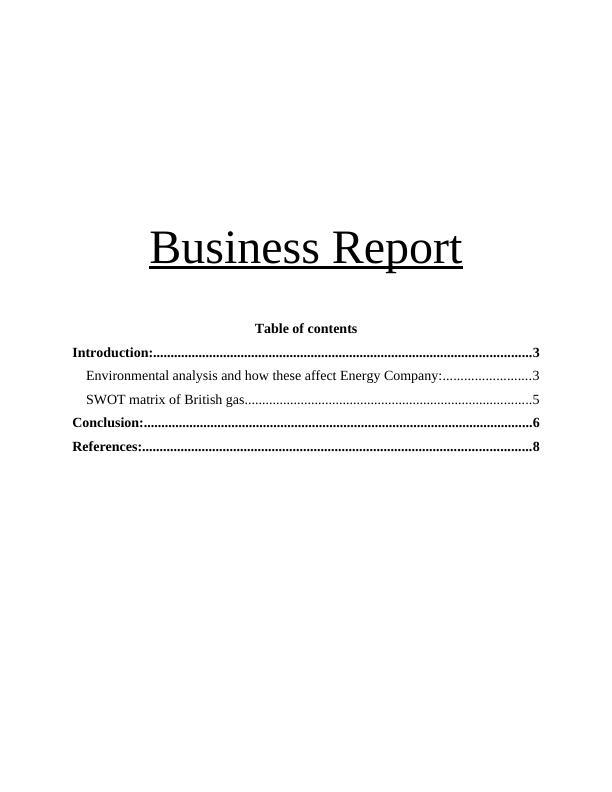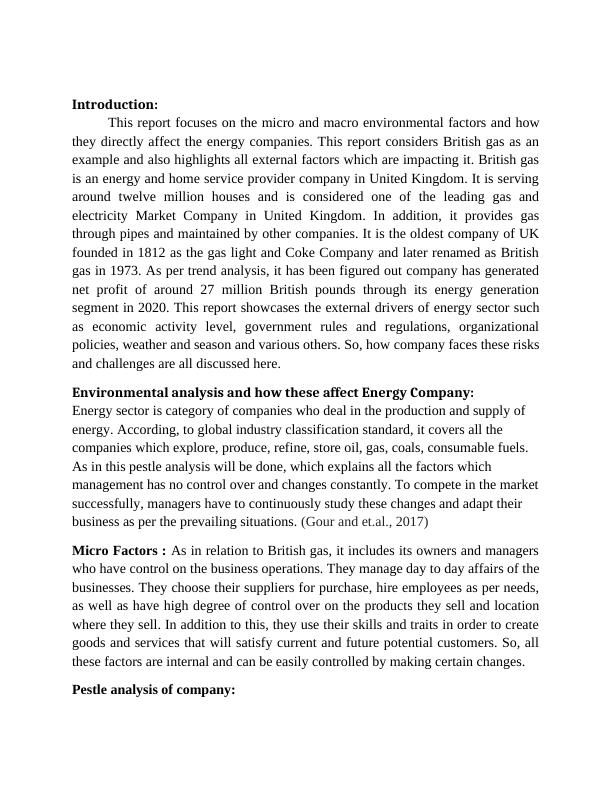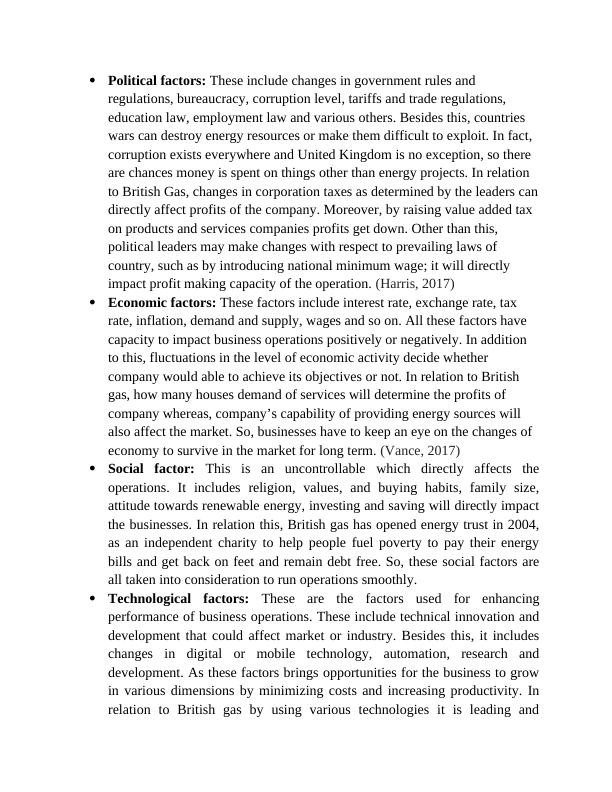Environmental Analysis and SWOT Matrix of British Gas
Added on 2023-06-14
6 Pages1910 Words375 Views
Business Report
Table of contents
Introduction:............................................................................................................3
Environmental analysis and how these affect Energy Company:.........................3
SWOT matrix of British gas..................................................................................5
Conclusion:...............................................................................................................6
References:...............................................................................................................8
Table of contents
Introduction:............................................................................................................3
Environmental analysis and how these affect Energy Company:.........................3
SWOT matrix of British gas..................................................................................5
Conclusion:...............................................................................................................6
References:...............................................................................................................8

Introduction:
This report focuses on the micro and macro environmental factors and how
they directly affect the energy companies. This report considers British gas as an
example and also highlights all external factors which are impacting it. British gas
is an energy and home service provider company in United Kingdom. It is serving
around twelve million houses and is considered one of the leading gas and
electricity Market Company in United Kingdom. In addition, it provides gas
through pipes and maintained by other companies. It is the oldest company of UK
founded in 1812 as the gas light and Coke Company and later renamed as British
gas in 1973. As per trend analysis, it has been figured out company has generated
net profit of around 27 million British pounds through its energy generation
segment in 2020. This report showcases the external drivers of energy sector such
as economic activity level, government rules and regulations, organizational
policies, weather and season and various others. So, how company faces these risks
and challenges are all discussed here.
Environmental analysis and how these affect Energy Company:
Energy sector is category of companies who deal in the production and supply of
energy. According, to global industry classification standard, it covers all the
companies which explore, produce, refine, store oil, gas, coals, consumable fuels.
As in this pestle analysis will be done, which explains all the factors which
management has no control over and changes constantly. To compete in the market
successfully, managers have to continuously study these changes and adapt their
business as per the prevailing situations. (Gour and et.al., 2017)
Micro Factors : As in relation to British gas, it includes its owners and managers
who have control on the business operations. They manage day to day affairs of the
businesses. They choose their suppliers for purchase, hire employees as per needs,
as well as have high degree of control over on the products they sell and location
where they sell. In addition to this, they use their skills and traits in order to create
goods and services that will satisfy current and future potential customers. So, all
these factors are internal and can be easily controlled by making certain changes.
Pestle analysis of company:
This report focuses on the micro and macro environmental factors and how
they directly affect the energy companies. This report considers British gas as an
example and also highlights all external factors which are impacting it. British gas
is an energy and home service provider company in United Kingdom. It is serving
around twelve million houses and is considered one of the leading gas and
electricity Market Company in United Kingdom. In addition, it provides gas
through pipes and maintained by other companies. It is the oldest company of UK
founded in 1812 as the gas light and Coke Company and later renamed as British
gas in 1973. As per trend analysis, it has been figured out company has generated
net profit of around 27 million British pounds through its energy generation
segment in 2020. This report showcases the external drivers of energy sector such
as economic activity level, government rules and regulations, organizational
policies, weather and season and various others. So, how company faces these risks
and challenges are all discussed here.
Environmental analysis and how these affect Energy Company:
Energy sector is category of companies who deal in the production and supply of
energy. According, to global industry classification standard, it covers all the
companies which explore, produce, refine, store oil, gas, coals, consumable fuels.
As in this pestle analysis will be done, which explains all the factors which
management has no control over and changes constantly. To compete in the market
successfully, managers have to continuously study these changes and adapt their
business as per the prevailing situations. (Gour and et.al., 2017)
Micro Factors : As in relation to British gas, it includes its owners and managers
who have control on the business operations. They manage day to day affairs of the
businesses. They choose their suppliers for purchase, hire employees as per needs,
as well as have high degree of control over on the products they sell and location
where they sell. In addition to this, they use their skills and traits in order to create
goods and services that will satisfy current and future potential customers. So, all
these factors are internal and can be easily controlled by making certain changes.
Pestle analysis of company:

Political factors: These include changes in government rules and
regulations, bureaucracy, corruption level, tariffs and trade regulations,
education law, employment law and various others. Besides this, countries
wars can destroy energy resources or make them difficult to exploit. In fact,
corruption exists everywhere and United Kingdom is no exception, so there
are chances money is spent on things other than energy projects. In relation
to British Gas, changes in corporation taxes as determined by the leaders can
directly affect profits of the company. Moreover, by raising value added tax
on products and services companies profits get down. Other than this,
political leaders may make changes with respect to prevailing laws of
country, such as by introducing national minimum wage; it will directly
impact profit making capacity of the operation. (Harris, 2017)
Economic factors: These factors include interest rate, exchange rate, tax
rate, inflation, demand and supply, wages and so on. All these factors have
capacity to impact business operations positively or negatively. In addition
to this, fluctuations in the level of economic activity decide whether
company would able to achieve its objectives or not. In relation to British
gas, how many houses demand of services will determine the profits of
company whereas, company’s capability of providing energy sources will
also affect the market. So, businesses have to keep an eye on the changes of
economy to survive in the market for long term. (Vance, 2017)
Social factor: This is an uncontrollable which directly affects the
operations. It includes religion, values, and buying habits, family size,
attitude towards renewable energy, investing and saving will directly impact
the businesses. In relation this, British gas has opened energy trust in 2004,
as an independent charity to help people fuel poverty to pay their energy
bills and get back on feet and remain debt free. So, these social factors are
all taken into consideration to run operations smoothly.
Technological factors: These are the factors used for enhancing
performance of business operations. These include technical innovation and
development that could affect market or industry. Besides this, it includes
changes in digital or mobile technology, automation, research and
development. As these factors brings opportunities for the business to grow
in various dimensions by minimizing costs and increasing productivity. In
relation to British gas by using various technologies it is leading and
regulations, bureaucracy, corruption level, tariffs and trade regulations,
education law, employment law and various others. Besides this, countries
wars can destroy energy resources or make them difficult to exploit. In fact,
corruption exists everywhere and United Kingdom is no exception, so there
are chances money is spent on things other than energy projects. In relation
to British Gas, changes in corporation taxes as determined by the leaders can
directly affect profits of the company. Moreover, by raising value added tax
on products and services companies profits get down. Other than this,
political leaders may make changes with respect to prevailing laws of
country, such as by introducing national minimum wage; it will directly
impact profit making capacity of the operation. (Harris, 2017)
Economic factors: These factors include interest rate, exchange rate, tax
rate, inflation, demand and supply, wages and so on. All these factors have
capacity to impact business operations positively or negatively. In addition
to this, fluctuations in the level of economic activity decide whether
company would able to achieve its objectives or not. In relation to British
gas, how many houses demand of services will determine the profits of
company whereas, company’s capability of providing energy sources will
also affect the market. So, businesses have to keep an eye on the changes of
economy to survive in the market for long term. (Vance, 2017)
Social factor: This is an uncontrollable which directly affects the
operations. It includes religion, values, and buying habits, family size,
attitude towards renewable energy, investing and saving will directly impact
the businesses. In relation this, British gas has opened energy trust in 2004,
as an independent charity to help people fuel poverty to pay their energy
bills and get back on feet and remain debt free. So, these social factors are
all taken into consideration to run operations smoothly.
Technological factors: These are the factors used for enhancing
performance of business operations. These include technical innovation and
development that could affect market or industry. Besides this, it includes
changes in digital or mobile technology, automation, research and
development. As these factors brings opportunities for the business to grow
in various dimensions by minimizing costs and increasing productivity. In
relation to British gas by using various technologies it is leading and

End of preview
Want to access all the pages? Upload your documents or become a member.
Related Documents
Macro Environmental Analysis of TESCO through PESTLE Analysislg...
|10
|2958
|95
Business Environment Analysis of British Petroleumlg...
|12
|4000
|39
ASDA Environmental Analysislg...
|13
|3176
|143
Assignment On British Petroleum Companylg...
|16
|5101
|1572
(PDF) What Next for the Oil and Gas Industry?lg...
|9
|3489
|205
Impact of Macro and Micro Factors on Business Objectives and Decision-Makinglg...
|8
|2017
|166
